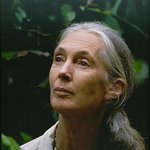World-renowned conservationist Jane Goodall Ph.D., DBE, Founder of the Jane Goodall Institute, and UN Messenger of Peace, has joined with animal protection charity Humane Society International to issue a heart-felt plea to the European Union not to overturn a ban passed last week at the CITES wildlife trade conference in Geneva that would end the capture of baby African elephants from the wild for export to zoos and circuses in China, the USA and elsewhere.
The ban was voted on and passed by the required 2/3 majority vote in Committee I of CITES largely because the EU was unable to vote due to a procedural issue (it had not yet filed its credentials). However a representative for the European Commission took to the floor to speak against the ban, and with its credentials now in order, the voting bloc of 28 looks set to oppose the decision in the plenary this week.
Dr. Goodall said: “This is to say that I am absolutely shocked at the thought of capturing young elephants, taking them from their families, and sending them off to a future which will inevitably involve a great deal of trauma and suffering. The bonds between infant elephants and their mothers are as strong and enduring – in some cases more so – as those between human children and their mothers. To break that bond is cruel and inhumane. I cannot imagine any caring person agreeing to such an unethical proposal and I hope with all my heart that the EU will not vote against the provisional decision taken in CITES with a two thirds majority.”
Dr. Goodall’s message to the EU follows an open letter signed by a host of stars such as Ricky Gervais, Simon Pegg, Leona Lewis, Dame Judi Dench, Alesha Dixon, Evanna Lynch, Bryan Adams, Virginia McKenna, Thandie Newton, Pamela Anderson, Peter Egan and Jenny Seagrove. The letter was co-ordinated by Humane Society International, the Born Free Foundation, the Brigitte Bardot Foundation, World Animal Protection, and David Shepherd Wildlife Foundation.
Jeffrey Flocken, President of Humane Society International said: “The capture of African elephants from Zimbabwe and Botswana to captive facilities is highly controversial. These highly social and emotional creatures can suffer physically and psychologically in captivity. There is no excuse for allowing this heartless trade to continue. As a 28-country voting bloc, the European Union’s vote is substantial and could easily overturn the decision if it chooses to oppose the ban. We hope EU leaders take heed of Dr. Goodall’s wise words and won’t condemn more elephant families to being ripped apart.”
Ian Redmond, tropical field biologist and conservationist who is renowned for his work with great apes and elephants, also expressed his opposition to the live elephant trade, saying: “Having studied elephants, I know how important an elephant’s childhood is – every elephant child learns how to thrive in their family’s habitat and that habitat benefits from the elephants. To separate a young elephant from his or her family for a life of social and sensory deprivation in captivity is bad for the captive, bad for the grieving family left behind, and bad for the habitat.”
At present, African elephants in Zimbabwe and Botswana are allowed to be captured and exported to so-called “appropriate and acceptable” destinations based on the annotation to the Appendix II listing of their elephant populations. However, it is under these conditions that Zimbabwe has captured more than 100 live baby African elephants in the wild and exported them to zoos in China since 2012. If the EU supports the ban and it is voted through, such international trade in live wild African elephants from Zimbabwe and Botswana will cease and be limited to only “in situ conservation programmes or secure areas in the wild within the species’ natural range, except in the case of temporary transfers in emergency situations”.





